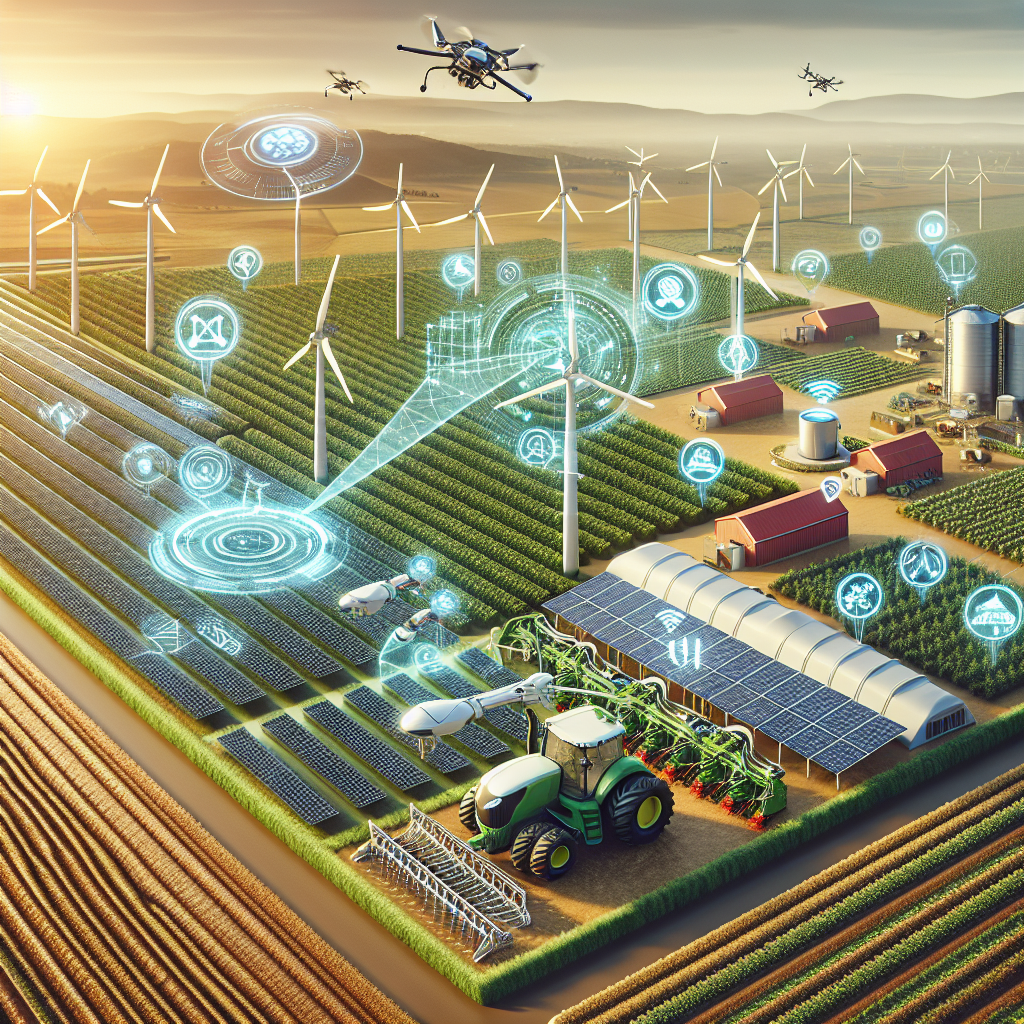Artificial Intelligence (AI) has revolutionized many industries, and agriculture is no exception. With the world’s population expected to reach 9.7 billion by 2050, the demand for food is growing rapidly. Sustainable farming practices are crucial to meet this growing demand while minimizing environmental impact. AI applications in agriculture can help farmers optimize their processes, reduce waste, and improve crop yields. In this article, we will explore some of the ways AI is being used in sustainable farming practices.
1. Precision Agriculture
Precision agriculture is a farming approach that uses technology to optimize crop yields while minimizing inputs such as water, fertilizers, and pesticides. AI can analyze data from various sources such as satellite imagery, drones, and sensors to provide farmers with insights on soil health, crop health, and weather patterns. This information allows farmers to make data-driven decisions on when to plant, irrigate, fertilize, and harvest crops, leading to higher yields and lower costs.
2. Crop Monitoring
AI-powered drones and satellites can capture high-resolution images of fields to monitor crop health and identify areas that need attention. Machine learning algorithms can analyze these images to detect early signs of diseases, pests, and nutrient deficiencies. By detecting these issues early, farmers can take corrective actions to prevent crop losses and reduce the need for chemical inputs.
3. Weed Management
Weeds compete with crops for water, nutrients, and sunlight, reducing yields and increasing production costs. AI-powered tools can identify and differentiate between crops and weeds, allowing farmers to target and control weeds more effectively. Some AI systems can even autonomously remove weeds using robotic arms or precision sprayers, reducing the reliance on herbicides.
4. Irrigation Management
Water scarcity is a major challenge for farmers, especially in arid regions. AI can help farmers optimize their irrigation practices by analyzing soil moisture levels, weather forecasts, and crop water requirements. By only irrigating when necessary and in the right amounts, farmers can reduce water wastage and energy costs while maintaining crop health.
5. Predictive Analytics
AI can analyze historical data on weather patterns, crop yields, and soil conditions to predict future outcomes. Farmers can use these predictions to make informed decisions on planting schedules, crop rotations, and pest management strategies. By anticipating potential challenges, farmers can mitigate risks and adapt their practices to changing conditions.
6. Supply Chain Optimization
AI can also be used to optimize the entire agricultural supply chain, from seed production to food distribution. By analyzing data on market demand, transportation costs, and storage capacities, AI can help farmers and food producers streamline their operations and reduce waste. This leads to more efficient use of resources and lower environmental impact.
FAQs
1. How can AI help farmers reduce their environmental impact?
AI can help farmers reduce their environmental impact by optimizing their use of resources such as water, fertilizers, and pesticides. By providing real-time insights on soil health, crop health, and weather patterns, AI enables farmers to make more precise and efficient decisions. This leads to lower inputs, reduced waste, and healthier ecosystems.
2. Are AI-powered farming practices cost-effective?
While the initial investment in AI technologies may be high, the long-term benefits often outweigh the costs. By improving crop yields, reducing inputs, and minimizing risks, AI-powered farming practices can increase profits for farmers. Additionally, some governments and organizations offer subsidies or grants to support the adoption of sustainable farming practices.
3. What are the challenges of implementing AI in agriculture?
One of the main challenges of implementing AI in agriculture is the lack of access to reliable data. Many farmers, especially in developing countries, may not have access to the necessary technology or infrastructure to collect and analyze data. Additionally, there may be concerns about data privacy and security when sharing sensitive information with AI providers.
4. Can small-scale farmers benefit from AI technologies?
Yes, small-scale farmers can benefit from AI technologies, especially through collaborative platforms and shared resources. By pooling their data and resources, small-scale farmers can access AI tools and insights that would otherwise be out of reach. This can help them improve their productivity, reduce costs, and compete more effectively in the market.
In conclusion, AI applications in sustainable farming practices have the potential to transform the agriculture industry and address the challenges of feeding a growing population while preserving the environment. By leveraging AI technologies for precision agriculture, crop monitoring, weed management, irrigation management, predictive analytics, and supply chain optimization, farmers can improve their productivity, reduce waste, and minimize environmental impact. With continued advancements in AI and increased adoption of sustainable farming practices, the future of agriculture looks promising.

